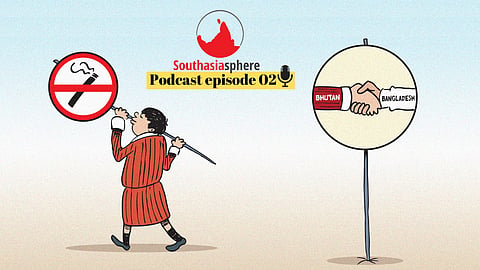Illustration by Gihan de Chickera.
Podcast
Constitutional change in Sri Lanka, Afghan peace talks, Bhutan-Bangladesh trade agreements and more
Southasiasphere podcast episode 02: Updates and analysis from around the region.
Southasiasphere, our analysis of regional affairs will be a monthly podcast featuring Himal editors! If you're a member, you'll automatically receive links to the new episodes in your inbox. If you're not yet a member, you can still get it for free (for the time being..) by signing up here.
In this audio episode of the roundup, we talk about constitutional change in Sri Lanka, Afghan peace talks, Bhutan-Bangladesh trade agreements and more.

